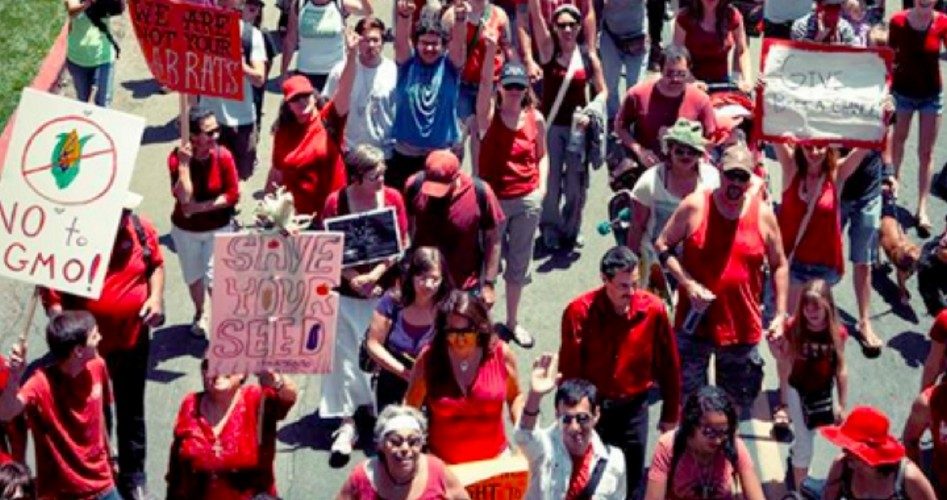
On Saturday, May 25, an estimated two million protesters turned out in 436 cities in 52 countries to protest genetically-modified (GM) foods and their primary developer, Monsanto Company, Inc. This far exceeded anything Tami Canal could have imagined when she created a Facebook page entitled “The March against Monsanto” back in February.
When Proposition 37 failed in California in November, Canal decided to do something about it. Prop 37 would have required labeling of GM food products so that (according to the bill) “the people of California [would be] fully informed about whether the food they purchase and eat is genetically engineered and not misbranded as natural so that they can choose for themselves whether to purchase and eat such foods.”
“If I had gotten 3,000 people to join me, I would have considered that a success,” Canal said Saturday. “It was empowering and inspiring to see so many people, from different walks of life, put aside their differences and come together today.”
She added: “We will continue until Monsanto complies with consumer demand. They are poisoning our children, poisoning our planet.”
One of the reasons that likely motivated Canal to focus on Monsanto was the discovery that opponents to Proposition 37 outspent supporters by five-to-one, with the biggest contributor to the “No Prop. 37” campaign being Monsanto with its $8 million gift, nearly as much as all the supporters garnered put together. The measure barely lost, 51 percent to 49 percent.
Others opposing Prop. 37 included GM food giants DuPont, PepsiCo, Kraft Foods, Bayer, Dow AgroSciences, BASF Plant Science, and Coca-Cola North America.
Monsanto has been increasingly perceived as a big bully, and the history of litigation on its Wikipedia entry goes on for pages. The first challenge to Monsanto’s claim that GM foods were natural and healthy came from the publishing of a peer-reviewed study by an obscure Hungarian-born scientist, Árpád Pusztai, in 1998. Under the auspices of the Rowett Research Institute in Scotland, Pusztai’s study found that feeding GM potatoes to rats led to “negative effects on their stomach linings and immune systems.” In a World in Action interview, he set off the world community with the statement that, if it were up to him, he wouldn’t eat GM foods. He added that it was “very, very unfair to use our fellow citizens as guinea pigs.” His remarks and his study were opposed with such vigor and vitriol that Pusztai, a 36-year veteran at Rowett with 270 papers and three books on plant lectins on his curriculum vitae, was terminated by Rowett. The controversy became known as the Pusztai Affair.
Investigative journalist Andrew Rowell looked into the incident and concluded that the pressure to sack Pusztai had come from not only scientists who took issue with parts of his study but also Monsanto officials, who had pressured President Clinton to call British Prime Minister Tony Blair. Blair had then called Rowett Institute Director Philip James and told him to terminate Pusztai.
In 2005 Pusztai, who has continued his work on plant lectins as well as speaking out on GM foods, received the Whistleblower Award from the Federation of German Scientists. In 2009 he received the Stuttgart Peace Prize.
Other studies since the Pusztai Affair have served to heighten concerns about GM foods while exposing Monsanto’s role as a bully trying to salvage its reputation by savaging its opponents. In 2007, 2009, and 2011 Gilles-Eric Seralini, a professor of molecular biology at the University of Caen in France, published the results of other studies that involved feeding Roundup-resistant maize to rats. Those studies found: GM foods caused liver, kidney, and heart damage in rats. Seralini suffered similar indignities from Monsanto and its allies, resulting in the “Seralini Affair.” This time, however, Seralini didn’t have to defend his position by himself; a letter signed by more than 130 of his peers was published in support of his work.
What’s at stake here isn’t Monsanto’s reputation. Monsanto has already been sufficiently tarnished and sullied by its own misbehavior, political manipulations, and thuggery. What is at stake is its position in the market. If the perception that GM foods may be unhealthy is ever accepted by the general population (Vermont and Connecticut just passed their own Prop 37 measures requiring GM labeling on food products), then Monsanto’s near-monopoly sustained through its influence over politicians is in jeopardy.
An estimated two million people took time off from their busy weekends to add their voices to those clamoring to end that monopoly and give people back their freedom to choose what kind of food they eat.
A graduate of Cornell University and a former investment advisor, Bob is a regular contributor to The New American magazine and blogs frequently at www.LightFromTheRight.com, primarily on economics and politics. He can be reached at [email protected]


